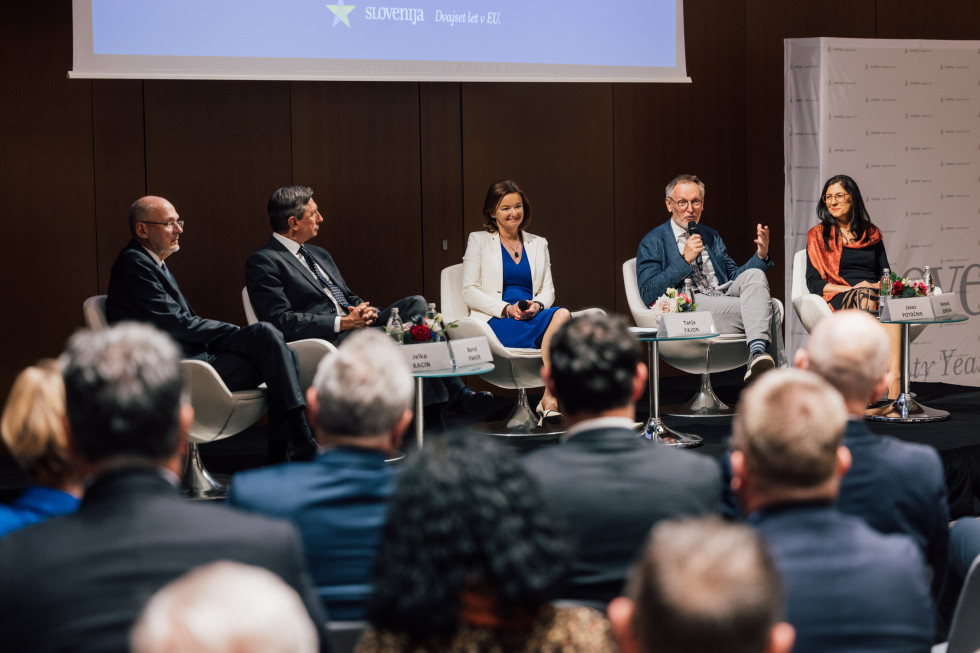On Europe Day, Minister Fajon, former MEPs and Commissioner discuss what Slovenia has gained with EU membership

Minister Tanja Fajon in discussion with former MEPs and Commissioner | Author Ministrstvo za zunanje zadeve
On the occasion of 9 May, which is celebrated as Europe Day, Minister Fajon stressed that »by joining the EU on 1 May 2004, Slovenia fulfilled one of its key strategic foreign policy objectives. The so-called 'Big Bang Enlargement' helped consolidate the new democracies of Central and Eastern Europe and made the EU the largest single market in the world. Slovenia went from being a successful candidate country to a visible and equal member of the European community. We can be truly proud that, in the twenty years of membership, the EU has become part and parcel of our daily lives.« At a debate, organised by the Ministry of Foreign and European Affairs in Nova Gorica, Minister Fajon and her guests, former Slovenian MEPs Borut Pahor, Jelko Kacin and Romana Jordan, as well as former EU Commissioner Janez Potočnik, first shared personal memories of the accession negotiations and the EU membership and then turned their attention to the future and the forthcoming European elections.
The speakers agreed on the importance of the major step taken by Slovenia when it joined the Eureopean Union in 2004, reminding that the road through the negotiations and meeting the EU's requirements had not been an easy one. Recalling Slovenia's arduous journey, Janez Potočnik underlined: “It has often been said that Slovenia is a good student – which could be interpreted in a pejorative way – but Slovenia’s negotiating team was very well organised, worked hand in hand and strongly believed in what we were doing. The politicians spoke with a relatively unified voice, which made it much easier for us, the team of experts”.
The debate also touched on the development of the Union over the past twenty years and the benefits of EU membership for Slovenia. Former MEP Borut Pahor, who also served as Prime Minister, President of the National Assembly and President of the Republic of Slovenia, reminded that we must always keep up with the work: »It is not accurate to say that Slovenia cannot change anything because of its size. This is simply not true. But it is necessary to have ideas and to put them into practice. I think we can be proud of the last 20 years. And Europe is not to blame if Slovenia has not managed to justify or implement things at the national level. We live in a safe and peaceful environment, which is very important. And none of this can be taken for granted, it must all be nurtured.«
The guests at the debate also mentioned some of the challenges facing the European society, the future of the European Union and the attitude of the Slovenian public towards the EU: »Slovenia has gone through two transformations: the first one was related to the harmonisation of legislation and the second one was after we became part of the Union. Once Slovenia became an EU member state, Slovenians have had a say in EU decisions. Here is where people saw politics at work, but unfortunately, our country failed to show the same unity as before. This lack of unity then began to tear us apart. During the first major successes – the euro, Schengen, the first EU Council presidency – Slovenia was still united, but later it was not. And this is what is missing in our approach if Slovenia wants to be as successful a country in the EU as we want it to be,« said former MEP Romana Jordan.
Former MEP Jelko Kacin also stressed how important it is for Slovenia to be united and to speak with one voice in the EU: »Slovenia has always done well when we were able and wanted to look beyond. We politicians were united, especially during our visits abroad, regardless of whether we were in coalition or in opposition parties. These visits helped us to build mutual trust, and that is what is most lacking in our Parliament today. Mutual trust is built at home, and in Europe, we need friends and allies. Together we can achieve so much more.«
The panellists agreed that the European Union has brought a lot to Slovenia and its citizens and that it is important for everyone to vote in the upcoming European elections and support the people we trust. »EU membership has improved our lives. As decision-makers and officials, we must therefore bring the EU closer to young people so that they understand that living in a society of peace and values such as democracy, freedom and human rights is not a given, and that it has taken hard work to get there,« concluded Minister Fajon in her closing remarks.
Before the start of the Europe Day celebrations, Minister Fajon met with the former President of the European Commission Romano Prodi. Together, they visited a special exhibition by Art Circle, an international visual arts festival that brings together culture, tourism, wine and international diplomacy. The collection has been in the making since 1997, and so far 20 countries have opened Cultural Embassies – a special form of art residency that takes place each spring and autumn within the festival in Slovenia and across the border in Italy. The Art Circle Festival has demonstrated that art is an inspiration and that culture connects and is the foundation of Europe.

